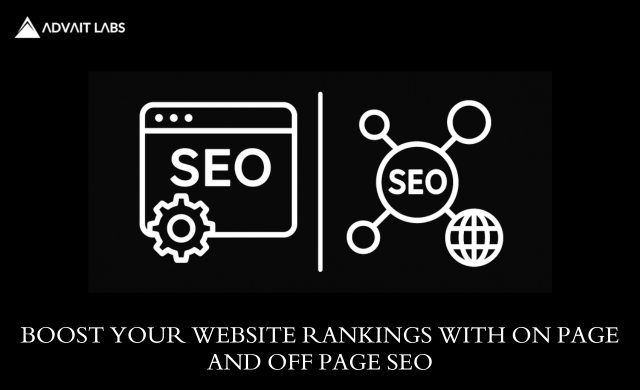Understanding On Page and Off Page SEO for Better Rankings

In today’s competitive digital landscape, mastering on page and off page SEO is crucial for any website looking to rank higher on search engines. At Advait Labs, located in Hyderabad, we’ve helped numerous businesses understand and implement SEO strategies that deliver measurable results. But what exactly is on page and off page SEO, and how do they differ? In this comprehensive guide, we’ll break it all down and show you how to leverage both for better rankings.
What is On Page and Off Page SEO?
Before diving deeper, let’s clarify the basics:
On Page SEO refers to all the optimizations that are done directly on your website to improve search engine rankings. This includes elements like:
- Quality content with relevant keywords
- Meta titles and descriptions
- Header tags (H1, H2, H3)
- Internal linking
- URL structure
- Image optimization
In contrast, Off Page SEO involves strategies implemented outside your website to enhance its authority and trustworthiness in the eyes of search engines. Examples include:
- Building high-quality backlinks
- Social media marketing
- Guest posting on reputable sites
- Influencer outreach
- Brand mentions
Understanding these two pillars of SEO is the first step toward creating a comprehensive digital strategy.
Difference Between On Page and Off Page SEO
To effectively improve your website rankings, it’s important to know the difference between on page and off page SEO:
| Feature | On Page SEO | Off Page SEO |
| Location | Optimizations are made directly on your website | Actions taken outside your website |
| Focus | Content quality, keyword usage, technical SEO | Authority building, link acquisition, social proof |
| Control | Fully controllable by website owner | Partially controllable, depends on external websites |
| Impact | Helps search engines understand your site | Signals credibility and trust to search engines |
In short, on page SEO helps search engines understand your content, while off page SEO tells them your website is credible and popular. Both are equally important for achieving higher search rankings.
Key Components of On Page SEO
Implementing effective on page SEO requires attention to several critical elements:
1. Keyword Optimization
Use your primary keyword on page and off page SEO strategically in your content, meta tags, and headers. Avoid keyword stuffing but ensure it appears naturally.
2. Content Quality
Create content that is informative, engaging, and valuable to your audience. Include variations of your primary keyword and related phrases to improve search engine relevance.
3. Meta Titles and Descriptions
Craft compelling meta titles and descriptions using your focus keyword. This not only improves SEO but also boosts click-through rates from search results.
4. Internal Linking
Link to other relevant pages within your website to improve navigation and distribute link equity, helping search engines crawl your site more effectively.
5. Technical SEO
Ensure your site loads quickly, is mobile-friendly, and has proper URL structures. Technical optimizations make it easier for search engines to index your content.
Key Components of Off Page SEO
While on page SEO is about optimization within your website, off page SEO focuses on building authority and reputation externally. Key strategies include:
1. High-Quality Backlinks
Secure backlinks from authoritative websites in your niche. Search engines view these as endorsements of your content’s quality.
2. Social Media Engagement
Active presence on social media platforms increases brand visibility and drives traffic to your site.
3. Guest Blogging
Contribute articles to reputable websites in your industry. This not only builds backlinks but also exposes your brand to new audiences.
4. Influencer Outreach
Collaborate with influencers or industry leaders to promote your content. This increases credibility and expands reach.
5. Brand Mentions
Encourage mentions of your brand across various platforms. Even unlinked mentions can positively impact search engine perception of your authority.
Best Practices for Combining On Page and Off Page SEO
To achieve the best results, integrate both strategies seamlessly:
- Start with Strong On Page SEO: Ensure your website is technically sound and content-rich.
- Build Quality Backlinks: Reach out to relevant websites for linking opportunities.
- Leverage Social Media: Share optimized content on social media channels.
- Monitor Performance: Use tools like Google Analytics and Search Console to track SEO performance and adjust strategies.
- Focus on User Experience: Both on page and off page SEO should enhance the user’s experience, as search engines prioritize websites that provide value.
By following these best practices, your website can achieve higher visibility, increased traffic, and better conversions.
FAQs on On Page and Off Page SEO
1. What is on page and off page SEO?
On page SEO involves optimizing elements within your website like content, meta tags, and technical structure, while off page SEO focuses on external strategies like backlinks, social signals, and brand mentions to boost credibility.
2. How can I improve the difference between on page and off page SEO?
The difference lies in control and focus. Improve on page SEO by optimizing content and technical elements, and enhance off page SEO by building authority through backlinks and social engagement.
3. Why is on page and off page SEO important for rankings?
Search engines evaluate both relevance and authority. On page SEO ensures your site is understandable and relevant, while off page SEO signals trustworthiness and popularity, both critical for higher rankings.
4. Can Advait Labs in Hyderabad help with on page and off page SEO?
Yes! Advait Labs specializes in both on page and off page SEO, helping businesses in Hyderabad and beyond improve rankings, traffic, and online visibility with customized strategies.
